With warmer weather coming our way, looking forward to relaxing in your own private pool isn’t unusual. For some of us, a small pool is all you want.
The problem is, that most small pools don’t come with a filter. As you know, cleaning it regularly is crucial to keep it in good condition. So, how exactly do you keep a small pool clean without a filter?
Keeping a small pool clean without a filter can be done by regular draining or using a hand vacuum. Depending on the size and local restrictions, the easiest thing can be to drain the pool and wipe down the sides. If this isn’t possible, a dose of stabilized chlorine and flocculant followed by vacuuming will work.
What your small pool will need to stay clean and how you can do it depends on a few factors. So, read on to find out more.
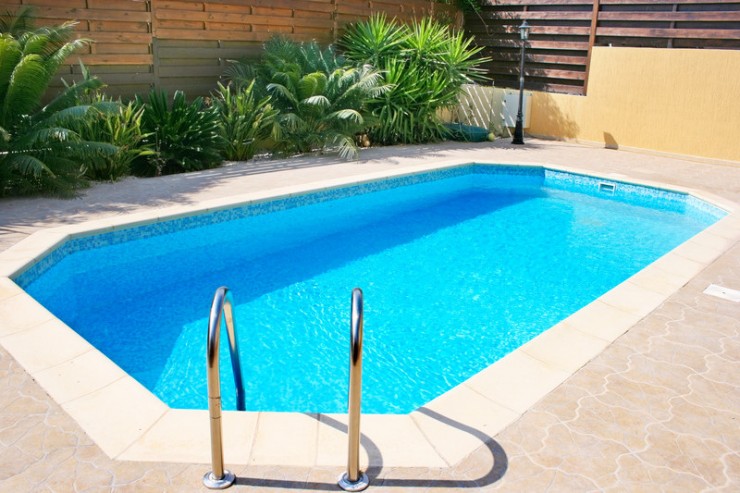
Article Contents
Why Is It Important to Keep Your Small Pool Clean?
You might think that cleaning a small pool isn’t a top priority. After all, some people just place it in their backyard and leave it, only topping up when needed or draining the pool after use. So, why is it important to keep your small pool clean?
Regardless of pool size, it doesn’t take long for bacteria and algae to grow in water, especially in stagnant (uncirculated) water. Small pools usually don’t have a filter or a pump, which makes them more likely to have algae and bacteria. Not cleaning your pool opens you and other pool users up to infection and illnesses.
Even if you choose to drain your pool after each day, this only scratches the surface of cleaning it. Depending on the design of your pool, there are crevices and joints where bacteria and algae can lodge even after drainage.
One of the easiest solutions to overcome this problem is adding chlorine to your pool. But, is it safe to use in a small pool?
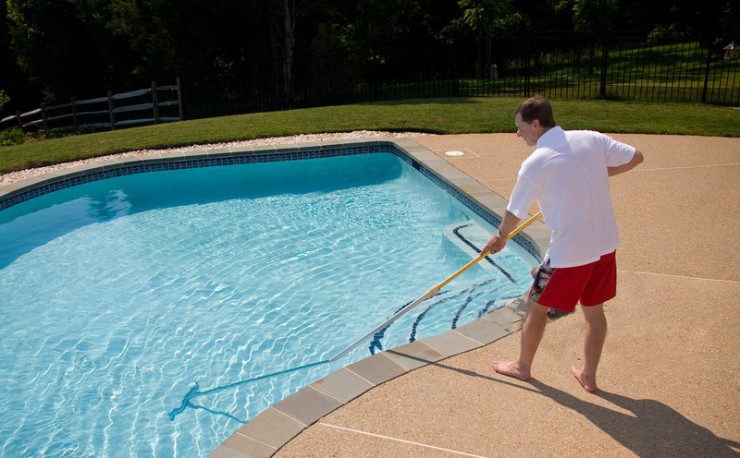
Can You Use Bleach in a Small Pool?
Chlorine is bleach in itself so it is possible to use household bleach in your kiddie pool. And, it could be a better solution than draining your pool, especially if you’re in a water-restricted area. If you do use bleach, it’s important there are no added fragrances.
The major perk of using specific chlorine for pools (either in tablet or liquid form) is that they often include cyanuric acid. This acid helps protect the chlorine from burning off by sun rays, i.e., stabilizing the chlorine. Without this, the chlorine will burn off before it properly cleans the pool.
If you’re curious to find out more about the advantages and disadvantages of using bleach in your pool, check out our article ‘Can You Use Bleach or Clorox in a Pool? Is it Cheaper?‘
Kiddie pools are usually small enough that you can simply drain them after use without adding bleach to the water. However, many local governments have water restrictions, particularly in times of drought. So, in those times, bleach is a great way for keeping your kiddie pool clean.
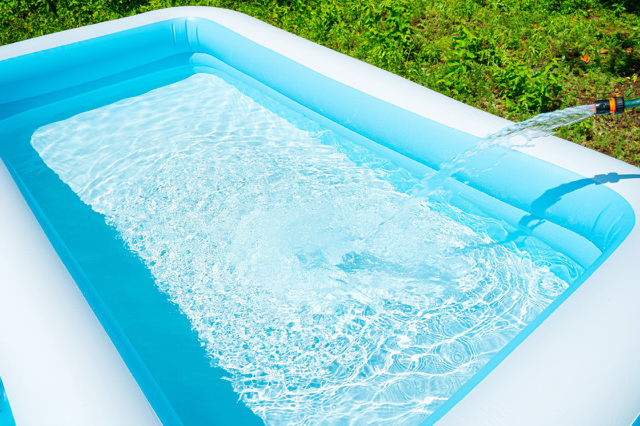
With most bigger pools (>10,000 gals [38,000 L]), you’ll need to have some sort of a filter and pump to help circulate the water as well as filter out dirt and impurities. But, do you need one for a small pool?
Do Small Pools Need a Filter?
Small pools don’t need a filter. You don’t need to invest in a filter for several reasons. Depending on the pool size, it might be too small to make proper use of a filter. You will however need to clean it in other ways.
Without a filter, you will need to manually clean out your pool by either draining it or using a pool skimmer and vacuuming after applying flocculant (if needed). So, it’s important to factor this in when choosing to get a small pool.
Some filters need a pool of at least 10,000 gals (37,800 L) in size to work properly. And, for smaller pools, sand filters or cartridge filters work better than D.E.
If you’re curious about what each filter type is capable of, check out our comparison guide here: ‘What’s the Best Pool Filter? Sand vs. Cartridge vs. DE‘
There are some filters specific to small pools though. Here they are:
INTEX 28637EG C1000 Krystal Clear Cartridge Filter Pump
INTEX 26643EG SX1500 Krystal Clear Sand Filter Pump
Is It Necessary to Drain a Small Pool to Clean It?
Even though it’s unnecessary to drain your pool to clean it, it is often the easiest way to do it. However, some local governments may have water restrictions in place preventing this method, especially if the water is chlorinated.
Regardless of the pool size, chlorinated water can have a negative effect on the surrounding plant and aquatic life if drained into the public mains. Even if you drain it on your own property, it can impact your lawn, plants, and animals who have access to the area. Plus, the water may seep into groundwater and spread out this way.
If your city has no drainage restrictions, then draining a small pool is the easiest way to clean it. Simply, add a hose and siphon the out the water into a sewer drain. Then, clean out the pool sides and bottom before refilling it with fresh water.
Though, again, be aware of any drought notices in place in your area before refilling your pool. Other than that, refilling your pool with tap water is one of the cheaper options (~$60 – $120) with the addition of pool chemicals afterward.
Ways to Keep a Small Pool Clean Without a Filter
Excluding fully draining and refilling your small pool, the main way to maintain it is by adding basic chemicals and vacuuming it regularly. So, you’ll need access to some pool essentials to do so, including a siphoning hose, skimming accessories, and a vacuum.
No matter which way you choose to clean your pool, it’s important to remember to balance the pool’s water chemistry afterward to prevent bacteria and algae from growing.
Which method and tool you decide to use depends on the pool’s construction materials and the size. For instance, extremely small pools, like kiddie pools, won’t need as much in-depth cleaning as bigger ones will need.
Essential Tools
Before cleaning your small pool, check for water restrictions in your area. Having done that, having access to the following tools will make cleaning even easier.
Telescopic Pole. Most essential item. Used for vacuuming, skimming, and brushing. Is usable with different attachments.
Vacuum Head. Attaches to a telescopic pole. Use it regularly. Use weighted one for concrete pool base. Or a wheeled brush type for vinyl-lined pools.
Siphoning Hose. Used to refill and drain the pool, as needed.
Battery Powered Pool Vacuum – A battery-powered pool vac will clean up settled dirt and debris from the bottom of the pool.
Pool Skimmer Net. This fine mesh net also attaches to the telescopic pole. Use daily to remove any floating debris.
Pool Brush Head. Use weekly to brush down pool walls of lodged dirt (that vacuuming can’t get). Can use stainless steel ones for concrete and plastic ones for vinyl liners.
Ideal Small Pool Cleaning Routine
To keep your small pool in pristine condition when you don’t have a filter, follow each of the steps below.
1. Skimming
Using your telescopic pole with its skimming head, collect all the debris floating on the water surface. Then, empty the collected debris into a bag. And, make sure to regularly clean the skimmer head as part of your cleaning routine.
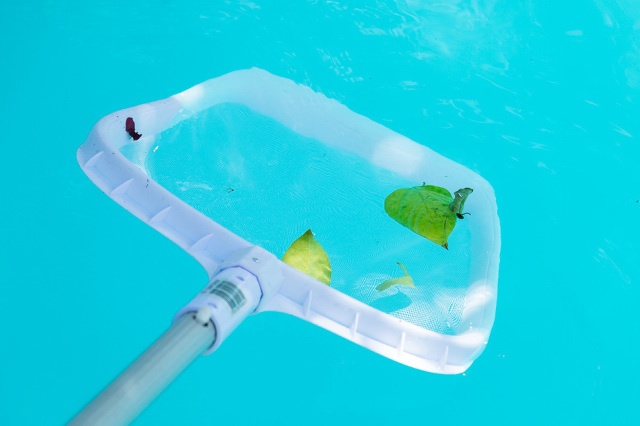
2. Brushing
Using your pool brush attachment, brush down all surfaces in the pool including walls, ladders, and steps. And, make sure to focus on crevices and corners as these are perfect places for bacterial growth. Again, as with the skimmer head, clean the brush regularly.
For inflatable and plastic pools, avoid steel brushes and use a nylon pool brush.
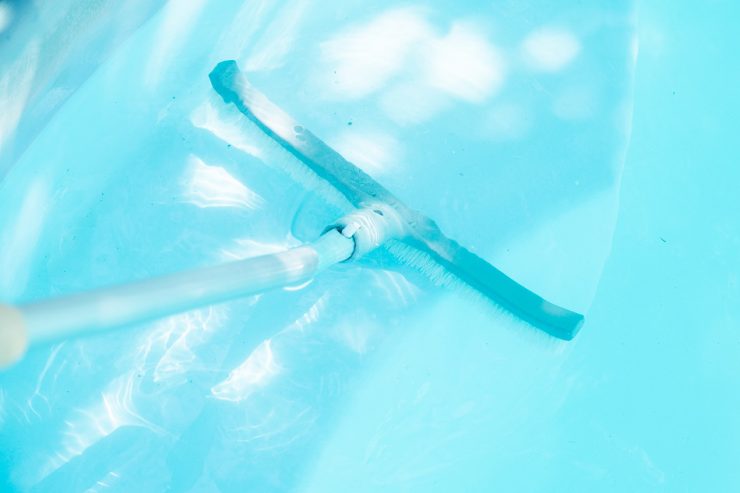
3. Vacuuming
Vacuuming your small pool is one of the more important things you can do to keep it clean when you don’t have a filter. Automatic pool cleaners for small pools aren’t suitable, you’ll need to vacuum it manually.
It’s ideal to vacuum your pool at least once weekly.
There are essentially three types:
- Vacuum head that uses your pool pump
- Battery-powered vacuum
- Garden hose powered pool vacuum
Vacuum Heads
If you decide to get a filter and pump, these are effective. They’re better for larger pools though. You’ll be connecting a hose to your skimmer to use this one. Often small pools don’t have a skimmer.
To use a vacuum cleaner attachment, first, put the vacuum head into the water, ensuring there’s no trapped air in the hose. Then, attach the hose to the skimmer, like you would with your household vacuum.
Robelle Premium Swimming Pool Vacuum Hose
HydroTools by Swimline Clear Weighted Triangle Pool Vacuum Head
Battery Powered Pool Vacuum
Small handheld battery-powered pool vacuums are perfect for kiddie pools and small inflatable pools such as the Intex Easy Set range.
They work similarly to a handheld vacuum for your house. Except, of course, you’ll be submerging this one.
Garden Hose Powered Pool Vac
Perhaps a little less convenient than battery-powered pool vacs, these pool vacuums are connected to your garden hose pipe. They use the water pressure to create suction.
With one of these, you’ll be able to vacuum up fine dirt, sand, leaves, and all the other debris in your pool in your small pool. And it will stay clean, even without a filter.
4. Balancing Pool Chemistry
After cleaning your pool (or even after heavy rain), it’s vital to re-balance your pool’s water chemistry. This is particularly important if you don’t have a filter.
We recommend these pool chemistry test strips to keep your pool crystal clear and inviting.
For a small pool, I recommend you add the following chemicals:
Chlorine
Balancing the pool chlorine is vital to keep your pool clean. The ideal range for your chlorine is between 1-3 ppm (parts per million) bleach is great or you can use stabilized chlorine such as dichlor or trichlor.
Here’s the amount of chlorine (dichlor) you’ll need to keep your small pool clean:
| Pool Size | Chlorine (dichlor) needed to raise total by 1 ppm |
| 10,000 gal (~37,800 L) | 2.0 oz (~56.7 g) |
| 9,000 gal (~34,000 L) | 1.8 oz (~51 g) |
| 8,000 gal (~30,000 L) | 1.6 oz (~45.3 g) |
| 7,000 gal (~26,500 L) | 1.4 oz (~39.7 g) |
| 6,000 gal (~22,700 L) | 1.2 oz (~34 g) |
| 5,000 gal (~18,900 L) | 1.0 oz (~28.3 g) |
| 4,000 gal (~15,100 L) | 0.8 oz (~22.7 g) |
| 3,000 gal (~11,300 L) | 0.6 oz (~17 g) |
| 2,000 gal (~7,500 L) | 0.4 oz (~11.3 g) |
| 1,000 gal (~3,700 L) | 0.2 oz (~5.7 g) |
Clorox 3″ Trichlor Chlorinating Tablets
Clorox Pool&Spa Chlorine Stabilizer
Stabilizer (Cyanuric Acid)
If you used bleach or another type of unstabilized chlorine, it’s a good idea to add cyanuric acid. Cyanuric acid will stabilize the chlorine. Keep it at around 50 ppm.
Baking Soda or Soda Ash to Raise the pH
The pH level of a pool should be 7.4-7.6. This will prevent skin and eye irritation as well as maximize the efficiency of chlorine.
Soda ash will raise the pH in large increments whilst baking soda will raise it slightly.
Muriatic Acid to Lower pH
If your pH level is too high, you can add muriatic acid to bring it back down.
5. Use a Swimming Pool Cover
This is more of a preventative step than anything else.
A lot of the debris in a pool comes from the environment. Dust, leaves, pollen, bird poo, etc. Covering your pool when it’s not in use will keep out all of this stuff. You’ll save time on vacuuming and as a bonus, the pool water will be a little warmer.
Here’s an option for a small pool here:
How Long Can a Small Pool Go Without a Filter?
With proper upkeep and cleaning, there is no limit on how long your small pool can go without a filter. But, it is absolutely vital that you regularly clean (using the steps above) and circulate the water to prevent bacterial and algal growth.
To preserve your small pool outside times of use, the best option is to drain it fully. This will prevent the water from stagnating and give bacteria the opportunity to grow.
Related Reading: Can You Add a Skimmer to Intex Above Ground Pools?
Final Thoughts
Whether your pool isn’t big enough to justify a filter or you just don’t want to deal with one, cleaning your small pool without a filter isn’t difficult.
As with most things in life, creating a cleaning routine for your pool will become second nature over time. And, with the handy tools mentioned above, this routine only gets easier and more streamline.

















